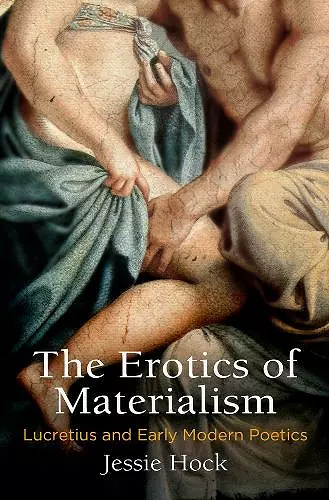The Erotics of Materialism
Lucretius and Early Modern Poetics
Format:Hardback
Publisher:University of Pennsylvania Press
Published:15th Jan '21
Currently unavailable, and unfortunately no date known when it will be back

Jessie Hock maps the intersection of poetry and natural philosophy in the early modern reception of Lucretius and his De rerum natura. Focusing on Pierre de Ronsard, Remy Belleau, John Donne, Lucy Hutchinson, and Margaret Cavendish, she demonstrates how these poets read De rerum natura as a treatise on the poetic imagination.
In The Erotics of Materialism, Jessie Hock maps the intersection of poetry and natural philosophy in the early modern reception of Lucretius and his De rerum natura. Subtly revising an ancient atomist tradition that condemned poetry as frivolous, Lucretius asserted a central role for verse in the practice of natural philosophy and gave the figurative realm a powerful claim on the real by maintaining that mental and poetic images have material substance and a presence beyond the mind or page. Attending to Lucretius's own emphasis on poetry, Hock shows that early modern readers and writers were alert to the fact that Lucretian materialism entails a theory of the imagination and, ultimately, a poetics, which they were quick to absorb and adapt to their own uses.
Focusing on the work of Pierre de Ronsard, Remy Belleau, John Donne, Lucy Hutchinson, and Margaret Cavendish, The Erotics of Materialism demonstrates how these poets drew on Lucretius to explore poetry's power to act in the world. Hock argues that even as classical atomist ideas contributed to the rise of empirical scientific methodologies that downgraded the capacity of the human imagination to explain material phenomena, Lucretian poetics came to stand for a poetry that gives the imagination a purchase on the real, from the practice of natural philosophy to that of politics.
In her reading of Lucretian influence, Hock reveals how early modern poets were invested in what Lucretius posits as the materiality of fantasy and his expression of it in a language of desire, sex, and love. For early modern poets, Lucretian eroticism was poetic method, and De rerum natura a treatise on the poetic imagination, initiating an atomist genealogy at the heart of the lyric tradition.
The Erotics of Materialism is an excellent study of early modern philosophy and poetics. It explicates the fruitful ways that Lucretius’s unorthodox ideas were used by a diverse group of poets—French and English, men and women, Catholics and Protestants, Royalists and Puritans—in an effort both to valorize poetry as a way of knowing and to find a new vocabulary for erotic passion. * Renaissance and Reformation *
This thoughtful, engagingly written book is a welcome addition to the ever-growing body of work that takes the postmedieval reception of Lucretius as its focus…[Hock] her book makes a strong and convincing case for reading poetry as a source not only of delight but transformative possibility. * L'Esprit Créateur *
Hock’s argument is tight and clean, and the book is clearly written; readers will come away more knowledgeable about Lucretius’s poetic influence in the early modern period...Erotics of Materialism is a highly compelling and informative read, and a welcome addition to the scholarly discussion of early modern 'dalliance' with the notorious Roman poet. * Seventeenth Century News *
What makes Hock’s book stand out is its commitment to reading Lucretius’s poetic afterlife in terms less of the notorious boost he gave materialist thought than of his contribution to the sixteenth- and seventeenth-century renewal of poetic forms. For as Hock elegantly demonstrates, scholars, in dwelling on the natural-philosophical content of Lucretian materialism, and thus on the bracing moral and cosmological challenge it put to the traditions of Platonized Christian orthodoxy, overlook how crucial Lucretius was for nonand even anti-Epicurean poets representing a wide range of ethical, social, and political attitudes...The Erotics of Materialism makes an original and important contribution to our understanding both of early modern European poetry and of its place in the broader assimilation of the materialist insights De rerum natura inspired. * Modern Language Quarterly *
[A] gripping and erudite account of the early modern reception of De rerum natura...The Erotics of Materialism is an important work. Hock traces how early modern French and English poets read Lucretius, certainly, but she also delivers a strong statement of purpose to reception studies, gauging the impact of De rerum natura in terms of experimentation and selective reading rather than as a matter of commitment or allegiance. * Modern Philology *
Where much of the scholarship on Lucretius and the early moderns examines his contributions to philosophy and science, Jessie Hock's brilliant book suggests powerful and far-reaching ways of engaging the specifically poetic aspects of Lucretian philosophy. * Elizabeth D. Harvey, University of Toronto *
ISBN: 9780812252729
Dimensions: unknown
Weight: unknown
288 pages